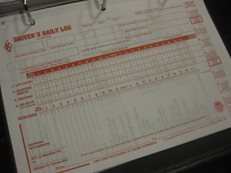
I recently wrote a blog in regards to onboard recorders and how they can possibly bring a value to our time and not just the miles we travel. The point I’m getting to here is that the rules should be focused on hours of service and not place of service.

When recording our time on paper logs, we are required to submit the place of our duty changes. The practice of having to write down the town or city is to identify hours of service. DOT uses these entries in our log book to identify any discrepancies.
With electronic logs, there should be no need to recreate where we put our hours in as it is “hours of service” the DOT is concerned with. The “hours of service rules” are the same no matter where we’re driving.
I fully understand where a fleet may want to use their on board recorders as a fleet management system. In fact, if I were a fleet, I would certainly be first in line to adopt this technology to manage my trucks. However, as a one truck independent owner operator, utilizing a fleet management portion of an electronic on board recorder has no benefit to my business. This has no value to me as I already know where my truck is located.
In conclusion, I have to ask myself… why so much focus is placed on “where” we put in the hours of service vs. how many hours we are putting in. After all, it is hours of service that create driver fatigue, not location. Also, this would help to mitigate the privacy issues which are subject to much controversy regarding the electronic recording of driver time.